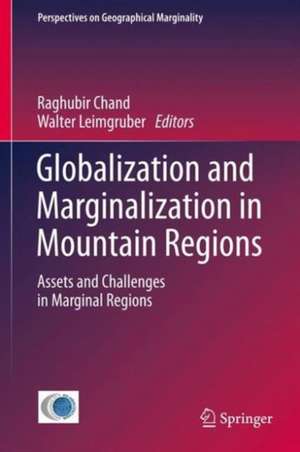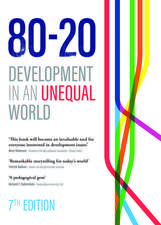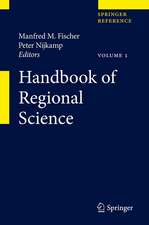Globalization and Marginalization in Mountain Regions: Assets and Challenges in Marginal Regions: Perspectives on Geographical Marginality, cartea 1
Editat de Raghubir Chand, Walter Leimgruberen Limba Engleză Hardback – 23 iun 2016
This book looks at the global importance of mountain systems, emphasizing their ecological and socio-economic role in light of climate change and globalization. With a special focus on the Himalayas, it also examines the Czech–German–Austrian mountain borderland, the Alps, the Andes, the highland regions of Malaysia, and the Arctic. The contributors, specialists in their fields, all use an integrative approach that develops and argues the concept of mountain regions as a global common good. Readers also discover that mountain systems and mountain communities are often marginalized and left behind by the process of globalization.
Case studies throughout detail the effects of climate change and global warming on both nature and local/regional societies, such as declining water supplies, a shifting vegetation line, and other important issues facing not only mountains but also the vast regions depending on them. In addition, the comprehensive coverageoffers authenticated viewpoints from some of the most eminent explorers of Tibet in the nineteenth century. More than 50 percent of the global human population draws benefits directly or indirectly from mountain resources and services. This book provides practitioners, researchers, students, and other interested readers with a compelling look at the global importance of this imposing, yet sensitive ecosystem.
| Toate formatele și edițiile | Preț | Express |
|---|---|---|
| Paperback (1) | 556.14 lei 38-44 zile | |
| Springer International Publishing – 31 mai 2018 | 556.14 lei 38-44 zile | |
| Hardback (1) | 648.24 lei 3-5 săpt. | |
| Springer International Publishing – 23 iun 2016 | 648.24 lei 3-5 săpt. |
Preț: 648.24 lei
Preț vechi: 762.64 lei
-15% Nou
Puncte Express: 972
Preț estimativ în valută:
124.06€ • 129.04$ • 102.42£
124.06€ • 129.04$ • 102.42£
Carte disponibilă
Livrare economică 24 martie-07 aprilie
Preluare comenzi: 021 569.72.76
Specificații
ISBN-13: 9783319326481
ISBN-10: 3319326481
Pagini: 192
Ilustrații: XVI, 240 p. 45 illus., 36 illus. in color.
Dimensiuni: 155 x 235 x 18 mm
Greutate: 0.64 kg
Ediția:1st ed. 2016
Editura: Springer International Publishing
Colecția Springer
Seria Perspectives on Geographical Marginality
Locul publicării:Cham, Switzerland
ISBN-10: 3319326481
Pagini: 192
Ilustrații: XVI, 240 p. 45 illus., 36 illus. in color.
Dimensiuni: 155 x 235 x 18 mm
Greutate: 0.64 kg
Ediția:1st ed. 2016
Editura: Springer International Publishing
Colecția Springer
Seria Perspectives on Geographical Marginality
Locul publicării:Cham, Switzerland
Cuprins
Introduction - Raghubir Chand and Walter Leimgruber.- Part 1. Development Potential of Mountain Regions and Globalization.- Chapter 1. Mountain Regions: A Global Common Good? - Bernard Debarbieux and Martin F. Price.- Chapter 2. Going Global: Livelihoods and Globalisation in the Niti Valley, Garhwal Himalaya, India - Keith Bosak and Sunil Kainthola.- Chapter 3. Globalisation and the Indian Himalayan States: Mitigating or Accentuating Marginalisation? - T.S. Papola. Chapter 4. The Impacts of Marginalization and Globalization in the Czech–German-Austrian Mountain Borderland in the Former Iron Curtain Area.- Alena Matuskova and Magdalena Bastova.- Chapter 5. The Himalayas as the Providers of Essential Ecosystem Services: Opportunities and Challenges - Andreas Schild.- Chapter 6. Hydropower Potential, Marginality and Sustainable Development. Examples from Tyrol/Austria and Aisén/Chile - Axel Borsdorf. – Chapter 7. Himalaya: Highest, Holy and Hijacked - Shekhar Pathak.- Chapter 8. Highlands Developments in Malaysia - Jamalunlaili Abdullah.- Chapter 9. The Arctic World in the Twenty-first Century: The Impact of Globalization on Demarginalization - Donald F. Lynch.- Chapter 10. Opening the Door of Tibet.- R.S Tolia. Part 2. Climate Change, Mountain Ecology and Adaptation in the Himalayas.- Chapter 11. Impact of Global Warming on Climate Change Regarding Water Supply in the Darjeeling Hills of the Eastern Himalaya and Change in Mountain Ecology – A. Basumajumdar.- Chapter 12. Ambient Air Quality Status and its Sources in Urban and Semi-urban Locations of Himachal Pradesh, India - Harinder Kumar Thakur and Jagdish Chandra Kuniyal.- Chapter 13. The Impact of Climate Change on the Shifting of the Vegetation Line in the Indian Himalaya: A Case Study from the Kutiyangti Watershed - J.S.Rawat, M. Kumar, Vivek Viswas, V.S. Rawat and N. Gahlot.- Chapter 14. Leguminous Plants of the Kumaun Himalaya: Diversity, Distribution, threats and Management - Kiran Bargali.- Chapter 15. Vulnerability of Highland Marginal Communities to Climate Induced Change and Practical Adaptive Capacity in the Sikkim Himalaya, India - Manoranjan Mishra, Vimal Khawas, Amrita Singh, Kausila Timsina, Karma Detsen Omgu Bhutia.- Chapter 16. Plant Diversity and Vegetation Composition of Shiwalik Forests along an Altitudinal Gradient in the Kumaun Himalaya, India - L.S. Lodhiyal, Neelu Lodhiyal and G.C. Pathak.
Recenzii
“Globalization and Marginalization in Mountains Regions a significant contribution to the literature on marginality studies in mountains. The contributors, all experts in their fields, use an integrative approach that advances the concept of mountain regions as a global common good. … This is all the more reason for practitioners, researchers, students, and other interested readers to take seriously the global importance of these imposing, yet sensitive ecosystems–mountains–and the challenges faced by those who call them home.” (Zac Robinson, Mountain Research and Development, Vol. 37 (1), February, 2017)
Notă biografică
Walter Leimgruber: His research interest includes boundaries and transborder relations, regional development and inequality issues. He obtained his PhD and university aggregation in the University of Basle (Switzerland) and taught at the University of Fribourg/CH from 1982 till his retirement in 2009. He has authored and edited/co-edited 7 books.
Raghubir Chand: His research interest is the mountain geography in the fields of Himalayan environment and land use planning, socio-economic and demographic transformation of Himalayan societies besides his involvement in migration studies, agricultural productivity, cultural geography, environmental and livelihood support systems of tribal communities of Bhutan and other parts of western Himalaya. He has published two books including Brokpas: The Hidden Highlanders of Bhutan (2004). He has published 70 papers in various national and international journals. He is in the editorial board and one of the founder members of PAHAR - a research journal of people’s Association for Himalayan Area Research based at Nainital.
Raghubir Chand: His research interest is the mountain geography in the fields of Himalayan environment and land use planning, socio-economic and demographic transformation of Himalayan societies besides his involvement in migration studies, agricultural productivity, cultural geography, environmental and livelihood support systems of tribal communities of Bhutan and other parts of western Himalaya. He has published two books including Brokpas: The Hidden Highlanders of Bhutan (2004). He has published 70 papers in various national and international journals. He is in the editorial board and one of the founder members of PAHAR - a research journal of people’s Association for Himalayan Area Research based at Nainital.
Caracteristici
Examines the important economic and ecological services that mountains provide to the world Considers the effects of climate change on nature and on local/regional societies Includes a particular focus on the Himalayas and marginal regions Includes supplementary material: sn.pub/extras



















